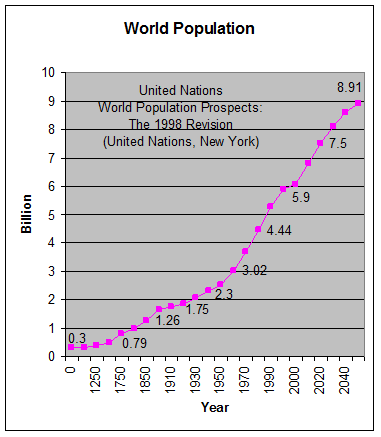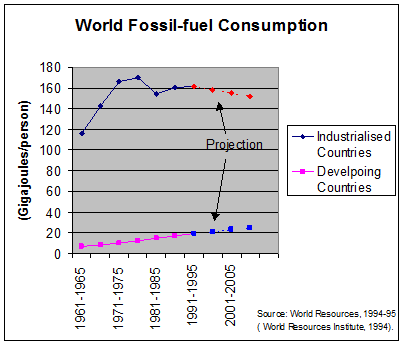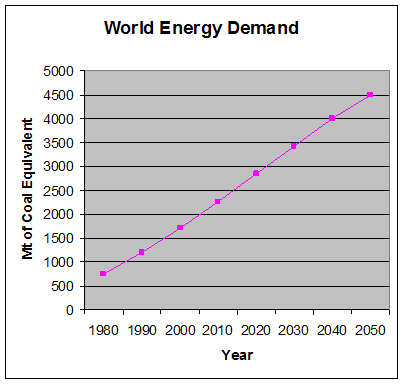World Population Growth
At the root of the world’s carbon dioxide problem is the greatest challenge facing the planet: over-population. Recent human population and technology growth has been so high, we are in danger of outrunning the ability of natural mechanisms to compensate for the environmental impact. In the 20th century the population of the world has already increased four times over. World population is certain to at least double in the next twenty years, driven by higher than replacement birth rates and longer life spans.

This situation is alarming, as it is not possible to slow world population before it doubles to around twelve billion. Some demographers believe that after that point population decline in the first world combined with resource depletion and disease will cause a, perhaps rapid, decline in global population.
Over 90% of world energy is presently obtained by burning carbon based materials such as coal, oil and wood products (including garbage) all resulting in increasing carbon dioxide production. At the same time the ability of biological systems to respond to higher carbon dioxide levels is being reduced by land clearing, soil degradation and pollution of rivers seas and oceans, particularly in coastal areas, as a result of excessive human population pressures.
It is possible that changes in lifestyle, domestic technology, industrial processes and improvements in combustion efficiency and distribution methods could offset population growth and stabilise consumption of carbon based fuels, including coal in a few developed countries.

Hope remains that it might be possible to meet the Toronto target in some developed countries. In parts of Europe the closure of “Rust Belt” industries in East Germany and the old “Iron Curtain” countries, combined with a move to nuclear power in others has made the Target achievable (depending on which year is taken as the base). This has not so much depended on stabilising or reducing energy consumption between now and the year 2005 as on closing older industries and converting from fossil fuel based energy to alternatives, in particular, nuclear power.
A 20% reduction in production in countries like Australia would require a substantial switch to alternative energy sources. In developing countries such a Target is not achievable.
But by the year 2005 the world's population will have inevitably grown to around six billion people and, at the same time, many now developing countries will have substantially increased their energy consumption per capita.
The energy consumed by this vast population is increasing per person at the same time.

The rate of energy consumption per capita in the world is very uneven. Under present technology, high energy consumption per capita equates with a high standard of living.
Each person in the industrialised west consumes around 8 times the fossil energy of each person in developing countries.
But people in developing countries are much more numerous and their population is growing faster.
In developed countries, growth in energy consumption was continuous from 1900 to 1980 with some fall off since that time. In developing countries per capita energy consumption has doubled in the past 20 years. Total energy consumption in the developed world doubled between 1950 and 1975.
Third World countries naturally demand that they be given the opportunity to improve their standard of living. Nor may it be possible to intervene to substantially limit the demand for energy in either the developed or the developing world without the destruction of world economic and political stability. Such a destruction of economic stability would very likely result in the deaths of tens of millions of people.
Increasing standards of living and the growing world population are conservatively expected to double world energy demand over the next thirty years (UN Projection).
It follows that the Toronto/Kyoto targets cannot be met world-wide unless very substantial new sources of energy (equivalent to over 3,000 million tonnes of coal per year by 2050) are found, which do not rely on the burning of carbon based fuels.
Alternatively economic development must stop now and this must be combined with an immediate stop in world population growth.
None of these is likely.
|
Population is a worldwide problem The parable of the pond applies: A village notices that its pond is infested with water weed. They measure the growth and calculate that the weed is doubling every day. In one year the weed will fully clog the pond and their village will have no water. Question: On what day will the weed have only half clogged the pond? Answer: On the eve of the last day. |
We may well be facing half a disaster, a full disaster may not be apparent, until it is too late.
